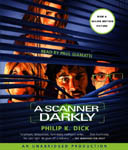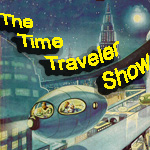

 A Scanner Darkly
A Scanner Darkly
By Philip K. Dick; Read by Paul Giamatti
8 CDs – Approx. 9.5 Hours [UNABRIDGED]
Publisher: Random House Audio
Published: 2006
ISBN: 073932392X
Themes: / Science Fiction / Drugs / Consciousness / Identity / Paranoia / Law Enforcement /
“I myself? I am not a character in this novel, I am the novel.”
-Philip K. Dick A Scanner Darkly
Bob Arctor is the owner of a ramshackle Orange County, California bungalow that houses a small group of drug users. The police think Bob is a dealer in the dangerously addictive drug called Substance-D but Bob really isn’t. Or is he? Fred thinks so, Fred is a deep-cover police agent assigned to surveil Bob’s every move by means of holoscanners and upclose undercover investigation – but Fred’s job is made more difficult because it requires him to take Substance-D, the effects of which have been to gradually split his brain into two very distinct and mutually combative conciousnesses. Fred schizm is so bad that he now doesn’t realize that he is also Bob Arctor and that he has in fact been narcing on himself! Fred/Bob’s only hope is to convince his/their dealer, a druggie named Donna, to get him to the source of Substance-D. Yep it is another typical Dickian plot, the downtrodden protagonist/s finds him/themselves at odds with complicated plot, which while not specifically aimed against him, is something in which he/they have become inadvertently entangled. Unfortunately when survival is the object of the game, Dick’s poor characters don’t know that doubling-down only multiplies the jeopardy by a factor of two.
Dick was no stranger to paranoid drug fantasies. Back in 1972 with his fourth marriage in ruins, an unsolved burglary in his Marin County home and a serious amphetamine addiction Dick travelled to Vancouver, British Columbia to be Guest of Honor at V-Con. After delivering a landmark speech he attempted suicide. Desperate for help, Dick begged and gained entrance to an exclusive heroin addiction treatment center called X-Kalay. This despite the fact he wasn’t addicted to heroin. When he eventually retuned to California he started work on a new novel. A Scanner Darkly was the result. Now 33 years later Dick’s novel has been adapted for audio as a result of the new film version. The good news is, no matter what you think of the film you’ll dig the audiobook. Despite what mayu sound like a downer, you’ll dig this book, A Scanner Darkly has some of the funniest scenes in all of Science Fiction. One section about a suicide gone wrong showcases Dick’s absurdist intellect… “[Charles Freck] spent several days deciding on the artifacts [that would be found by the archaeologists who discovered his dead body]….He would be found lying on his back, on his bed, with a copy of Ayn Rand’s The Fountainhead (which would prove he had been a misunderstood superman rejected by the masses and so, in a sense, murdered by their scorn) and an unfinished letter to Exxon protesting the cancellation of his gas credit card.” Even better, the ending is masterful, giving up the same Science Fiction satisfaction as did his Hugo winning The Man In The High Castle.
Actor Paul Giamatti (who had a supporting role in the film version of PKD’s Paycheck) was the perfect choice to read A Scanner Darkly. Giamatti’s on-screen characters only hint at his range and it took this audiobook to showcase all that talent. This is an excellent performance, Giamatti has said that Steve Bucemi should have been cast in the Tom Cruise role of the Minority Report film but I’m thinking it should have been Giamatti. His sympathetic portrayal of these drugged-out hippies and drugged-up cops makes this Random House’s A Scanner Darkly the definitive reading of a Dick novel. Giamatti ably gives distinction to the cast of losers and even carries off the German sequences without a hitch. What blows me away about this production is that Giamatti had expresed interest* in being in the Linklater film version of the same name, Giamatti has stated in multiple interviews that he is a fan of PKD’s work. Giamatti has even been approached to play PKD in a film adaptation of Dick’s life! That’d be a hoot.
Two Seeing Ear Theater alumni, Brian Smith and John Colluci, produced and directed Giamatti’s performance. The audiobook also includes intro music and the complete coda; a list by Dick of many of his closest friends who died or were severely damaged by drug use. I heartily endorse this unabridged audiobook and we in our influenced wisdom have seen fit to grant it a hallowed place in the hall of SFFaudio Essentials. This is a book to be long remembered and a reading never to be forgotten.
*Entertainment Weekly (issue #884/885 Summer 2006 Double Issue – page 117)
Posted by Jesse Willis


 The Time Traveler Show podcast #2 is LIVE from the future! In this episode the eponymous Time Traveler waxes nostalgic for his favorite old time podcasts; Dragon Page Cover-To-Cover, Escape Pod, and Spaceship Radio. Even better, podcast #2 has two complete and unabridged stories from the February 1957 issue of The Magazine Of Fantasy And Science Fiction! First up is a short story, The Inferlab Project by G.C. Edmondson (read by Terry Lenz). Next is a flash fiction story called Expedition by the legendary Fredric Brown (read by The Time Traveler himself). You can read the complete show notes HERE or download the show HERE.
The Time Traveler Show podcast #2 is LIVE from the future! In this episode the eponymous Time Traveler waxes nostalgic for his favorite old time podcasts; Dragon Page Cover-To-Cover, Escape Pod, and Spaceship Radio. Even better, podcast #2 has two complete and unabridged stories from the February 1957 issue of The Magazine Of Fantasy And Science Fiction! First up is a short story, The Inferlab Project by G.C. Edmondson (read by Terry Lenz). Next is a flash fiction story called Expedition by the legendary Fredric Brown (read by The Time Traveler himself). You can read the complete show notes HERE or download the show HERE.

 A Scanner Darkly
A Scanner Darkly


